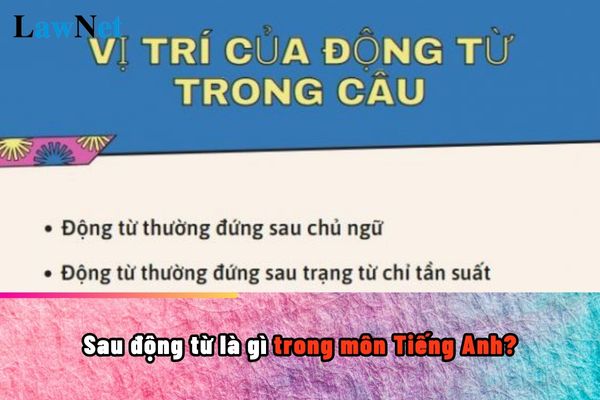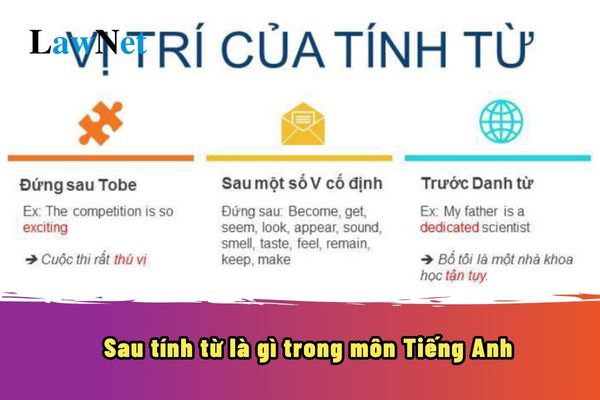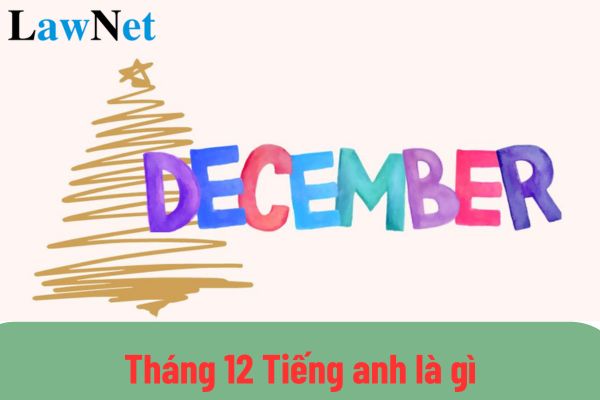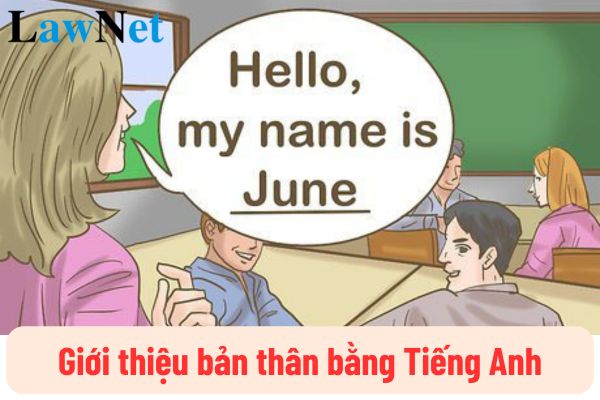What follows the verb in English? What are regulations on assessment of the educational outcomes of English in primary education in Vietnam?
What follows the verb in English?
In English, depending on the context and the type of verb, verbs can be followed by the following.
| * Adverb: Manner: He drives carefully. Degree: She loves him very much. Time: They will arrive tomorrow. Place: I live here. * Noun: Direct object: I like apples. Indirect object: He gave me a book. * Adjective: Complement to the object: I consider him intelligent. After some linking verbs: The soup tastes delicious. * Gerund: After certain verbs: I enjoy reading. * To infinitive: After certain verbs: I want to learn English. * Clause: Noun clause: I know that he is coming. Adjective clause: The book which I bought yesterday is interesting. *Note: The type of word that follows the verb depends on the meaning of the verb: Each verb typically goes with one or a few specific types of words. Sentence structure: Sentence structure also affects the type of word that follows the verb. *Examples: Verb + adverb: She sings beautifully. Verb + noun: I eat an apple. Verb + adjective: The sky is blue. Verb + gerund: I enjoy swimming. Verb + to infinitive: He wants to go home. Some Examples: 1. Verb + adverb: Manner: She sings beautifully. Degree: He works very hard. Time: They will come tomorrow. Place: I live here. 2. Verb + noun: Direct object: I like apples. Indirect object: He gave me a book. 3. Verb + adjective: Complement to the object: I consider him intelligent. After linking verbs: The soup tastes delicious. 4. Verb + gerund: I enjoy reading. 5. Verb + to infinitive: I want to learn English. 6. Verb + clause: Noun clause: I know that he is coming. Adjective clause: The book which I bought yesterday is interesting. *Some more complex examples combining multiple elements: He asked me to go to the movies. (ask + object + to infinitive) She found the book very interesting. (find + object + adjective) I saw him running in the park. (see + object + gerund) |
*Note: Above information is for reference only./.

What follows the verb in English? What are regulations on assessment of the educational outcomes of English in primary education in Vietnam? (Image from Internet)
What are regulations on assessment of the educational outcomes of English in primary education in Vietnam?
According to Section VII of the English Language Subject Curriculum for General Education issued with Circular 32/2018/TT-BGDDT, the evaluation of primary-level English education results is as follows:
- Testing and evaluation are essential in the teaching process to provide feedback on the English communication skills students acquire during the learning process and at the completion of a stage.
- This contributes to encouraging and guiding students in their learning process, helping teachers and schools assess students' learning outcomes, thereby adjusting the teaching of the subject effectively at different educational levels.
- The evaluation of students' learning activities must align with the objectives and content of the Program, based on the requirements for communication skills at each grade, aiming to help students achieve the prescribed levels of communication competence upon completing the primary, lower secondary, and upper secondary levels.
- Assessment activities should be conducted in two forms: continuous assessment and periodical assessment. Continuous assessment is carried out continuously through classroom teaching activities.
- During the teaching process, priority should be given to continuous assessment to help students and teachers monitor the progress towards the objectives set out in the Program. Periodical assessments are conducted at specified times in the school year to evaluate the extent of achievement against the required outcomes for each grade level.
- The evaluation at the end of primary, lower secondary, and upper secondary levels must be based on the requirements for language proficiency according to the 6-level Foreign Language Proficiency Framework used for Vietnam, specifically Level 1 for primary education, Level 2 for lower secondary education, and Level 3 for upper secondary education.
- Evaluation is carried out through different forms such as quantitative, qualitative, and a combination of both throughout the learning process, incorporating teacher assessment, peer assessment, and self-assessment by students.
- Types of tests and evaluations should be appropriate to the teaching methods applied in the classroom, including spoken tests (dialogue, monologue) and written tests integrating language skills and knowledge, combining objective tests, subjective tests, and other assessment forms.
Download the English Language Subject Curriculum for general education.
What are grade 5 English textbooks in general education in Vietnam?
According to the list of textbooks for subjects, educational activities in grade 5, and textbooks for the Chinese Language subject in grades 3 and 4 used in general education issued with Decision 4119/QD-BGDDT in 2023, the list of grade 5 English textbooks includes:
| Title | Author(s) | Organization or Individual | Partner Unit |
| English 5 (Global Success) | Hoang Van Van (General Editor), Tran Huong Quynh (Chief Editor), Phan Ha, Do Thi Ngoc Hien, Dao Ngoc Loc, Nguyen Minh Tuan, Nguyen Quoc Tuan. | Vietnam Education Publishing House | |
| English 5 (Family and Friends - National Edition) | Tran Cao Boi Ngoc (Chief Editor), Pham Nguyen Bao Ngoc. | Vietnam Education Publishing House | |
| English 5 (Macmillan Next Move) | Hoang Tang Duc (Chief Editor), Do Thi Thuy Van, Nguyen Thi Xuan. | Ho Chi Minh City University of Education Publishing House | |
| English 5 (Explore Our World) | Dao Xuan Phuong Trang (Chief Editor), Nguyen Thanh Binh, Dinh Tran Hanh Nguyen, Nguyen Ho Thanh Truc, Huynh Gia My. | Vepic Company | Ho Chi Minh City University of Education Publishing House |
| English 5 (i-Learn Smart Start) | Vo Dai Phuc (General Editor), Nguyen Duong Hoai Thuong (Chief Editor), Nguyen Thi Ngoc Quyen, Le Huynh Phuong Dung. | Vietnam Education Solutions Co., Ltd. | Ho Chi Minh City University of Education Publishing House |
| English 5 (Extra and Friends) | Vo Dai Phuc (General Editor and Chief Editor), Nguyen Thi Ngoc Quyen. | Vietnam Education Solutions Co., Ltd. | Ho Chi Minh City University of Education Publishing House |
| English 5 (Wonderful World) | Nguyen Vu Quynh Nhu (Chief Editor), Tran Thi Thao Phuong, Dang Thi Cam Tu, Tran Thi Thu Suong. | University of Education Publishing House | |
| English 5 (English Discovery) | Tran Thi Lan Anh (Chief Editor), Cao Thuy Hong. | University of Education Publishing House | The Buom Wing Education Investment and Development Company Limited |
| English 5 (Guess What!) | Nguyen Thi Dieu Ha (Chief Editor), Can Thi Chang Duyen, Nguyen Thuy Lan, Nguyen Thi Thu Hoai. | University of Education Publishing House | |
| English 5 (Phonics-Smart) | Le Hoang Dung (Chief Editor), Quan Le Duy. | Vietnam National University Ho Chi Minh City Publishing House |





- What is the law on light reflection? What are details of the law on light reflection?
- What is the schedule of the AFF Cup 2024 (ASEAN Cup)? What are activities for physical education and sports in vocational education institutions in Vietnam?
- What is the schedule for the AFF Cup 2024 matches of the Vietnam National Team? Are students who are athletes in Vietnam eligible for a special exemption from high school graduation requirements?
- Vietnam: What are the guidelines for analysis of the poem "Tiến sĩ giấy"? What is the regulatory age of students entering lower secondary education?
- What is the location of Vietnam International Defense Exhibition 2024? Are students of all educational levels granted leave to visit the Vietnam International Defense Exhibition?
- What is the formula for calculating population density in Vietnam? What is the population density?
- Vietnam: What is the sample parent-teacher conference scenario at the end of the first semester of primary education? What are the regulations on the organization of parent committees?
- Vietnam: What is the sample outline for an essay on the analysis of the excerpt "The Last Leaf"? What are the assessment levels for learning results in the school year of 8th-grade students?
- What is the unit of power? When do students in Vietnam study the unit of power?
- What is the guidance for children to tell the story "Chuyện bốn mùa"? What is the age of students entering 2nd grade in Vietnam?

